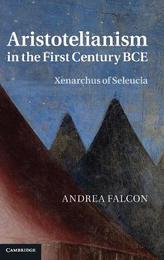
|
Aristotelianism in the First Century BCE: Xenarchus of Seleucia
Hardback
Main Details
| Title |
Aristotelianism in the First Century BCE: Xenarchus of Seleucia
|
| Authors and Contributors |
By (author) Andrea Falcon
|
| Physical Properties |
| Format:Hardback | | Pages:240 | | Dimensions(mm): Height 235,Width 159 |
|
| Category/Genre | Western philosophy - Ancient to c 500 |
|---|
| ISBN/Barcode |
9780521876506
|
| Classifications | Dewey:185 |
|---|
| Audience | | Professional & Vocational | |
|---|
|
Publishing Details |
| Publisher |
Cambridge University Press
|
| Imprint |
Cambridge University Press
|
| Publication Date |
15 December 2011 |
| Publication Country |
United Kingdom
|
Description
This book is a full study of the remaining evidence for Xenarchus of Seleucia, one of the earliest interpreters of Aristotle. Andrea Falcon places the evidence in its context, the revival of interest in Aristotle's philosophy that took place in the first century BCE. Xenarchus is often presented as a rebel, challenging Aristotle and the Aristotelian tradition. Falcon argues that there is more to Xenarchus and his philosophical activity than an opposition to Aristotle; he was a creative philosopher, and his views are best understood as an attempt to revise and update Aristotle's philosophy. By looking at how Xenarchus negotiated different aspects of Aristotle's philosophy, this book highlights elements of rupture as well as strands of continuity within the Aristotelian tradition.
Author Biography
Andrea Falcon is Associate Professor of Philosophy at Concordia University, Montreal. He is the author of Aristotle and the Science of Nature: Unity without Uniformity (Cambridge, 2005) and Corpi e Movimenti: Il De Caelo di Aristotele e la sua Traditione nel Mondo Antico (2001).
Reviews'Xenarchus of Seleucia was a contemporary of Strabo who was active as a teacher of philosophy in Alexandria, Athens and Rome at the time of Augustus. Falcon's study is the first monograph to be wholly dedicated to this Peripatetic writer, from whom a few fragments survive ... a valuable tool for the study of a period of philosophical activity that is still surrounded by mystery, and contributes to the better understanding of the hermeneutical strategies towards Aristotle's text that preceded the development of the commentary tradition in the Imperial period.' Bryn Mawr Classical Review
|